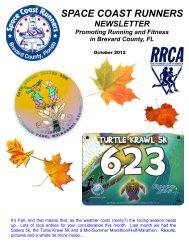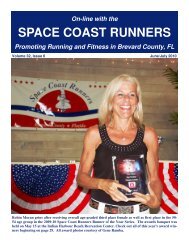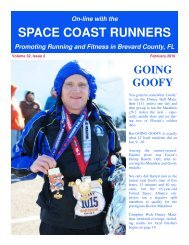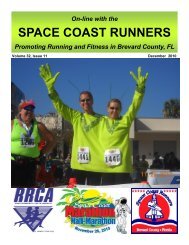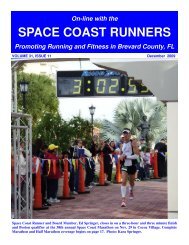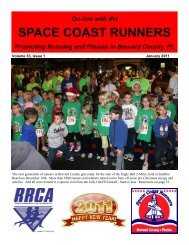May - Space Coast Runners
May - Space Coast Runners
May - Space Coast Runners
- No tags were found...
Create successful ePaper yourself
Turn your PDF publications into a flip-book with our unique Google optimized e-Paper software.
Alternatively, if you want to retain flexibility but don't want it to feel quite so regimented, Williams suggests trying someother sport that works your range of motion. Williams suggests tennis, but pretty much anything is better than nothing,even golf. "There are a lot of things you can do," he says. "You don't need a gym."McMillan agrees. Experiment with different types of flexibility training, he says. "As a masters runner, you've got to investigateand find the methods that work."Declining Muscle PowerAnother indisputable side effect of aging is a decline in muscle mass. According to the American College of Sports Medicine,muscle strength and mass begin decreasing at age 40, with the process speeding up after age 65 or 70. Of particularconcern to runners, the loss generally occurs fastest in the lower body.The rate of loss appears to be faster for fast-twitch fibers than for slow-twitch. That's a greater problem for sprinters thanfor distance runners, but it should be of concern for everyone because it's possible to lose all of your fast-twitch fibers.And when that happens, nobody knows how to get them back.Scott Trappe, director of the Human Performance Laboratory at Ball State University in Muncie, Ind., was the head of theteam that made this discovery. The likely reason, he said at the time, is changing lifestyles. As people age, particularlyinto their 70s and 80s, they stop doing the high-intensity activities that call for fast-twitch fibers. The result is that thesefibers atrophy until they're gone ... permanently."The body is going to react to demands," adds Brown. "If you don't demand it any more -- if you think, 'I'm too old to dothis, and I'm strong enough anyway,' then you'll start to lose muscle mass."The solution is vigorous weight-training: the type that gives the same type of "burn" younger athletes seek, albeit atwhatever lower weight you can now handle. Fancy health club machines aren't necessary. Rubber tubing, free weights,stretchy bands, calisthenics: any of those can help. "As long as you're doing something two or three days a week to pushyourself to a point where you're saying, 'This is starting to get pretty hard,'" Williams says.Adds McMillan: "The best masters runners never stop. They don't have big down times. They seem to be always trainingand racing. That may help. The initial research was showing that if you just keep with it, you can reduce that loss of musclecomposition."Slower recovery and healing ratesNone of these approaches works if you push too hard, too often. "All the evidence I read doesn't suggest that you canactually slow the aging process," Noakes once told me. "In contrast, I think you can accelerate the aging process if youoverdo the exercise."For younger athletes, he thinks overdoing it is running more than about two hours a day. But many masters runners findthat it takes longer than it once did to recover from workouts and races. Lots of factors may be involved, but the simplestto understand is at the cellular level, where tissue repair and replacement simply don't occur as rapidly as they once did.What this means is that as you age, you may have to experiment with changing your workout pattern. When CarlosLopes of Portugal won the Olympic marathon at age 37, then went on to win the Rotterdam Marathon at age 38 with anew world record of 2:07:12, Alberto Salazar asked him what he did differently at that age. "Carlos was definitely at anage where most people start having to make adjustments," Salazar says. "He told me that his main adjustment had beento reduce the frequency of his hard workouts. These workouts, he said, still needed to be as intense as ever; he simplyallowed more recovery time between them."McMillan agrees. Masters runners need to do every type of workout that younger runners do, but they may need to altertheir schedules. And they may need to allow more time to adapt. "We are so engrained with Tuesday-Thursday [speed],Sunday long run," he says. "You almost have to throw that out the window and start looking at what's going to help.That's going to be different for every runner."Masters runners also need to be careful to allow enough recovery time after races. "It used to be a race on Saturday,long run on Sunday; no problem," McMillan says. "When you get older, that may not be the best routine."Page 24



